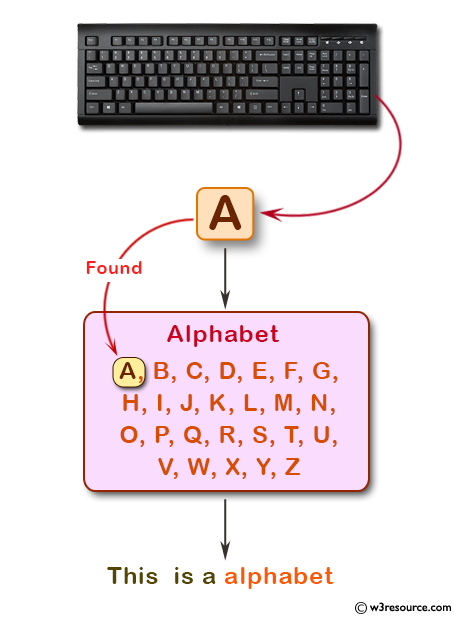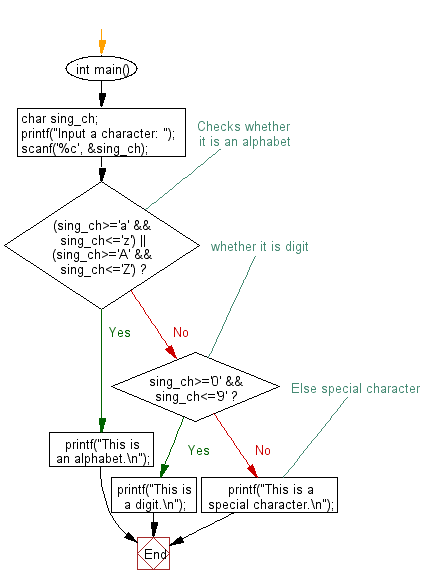C Exercises: Check whether a character is an alphabet, digit or special character
C Conditional Statement: Exercise-16 with Solution
Write a C program to check whether a character is an alphabet, digit or special character.
Pictorial Presentation:

Sample Solution:
C Code:
#include <stdio.h>
int main()
{
char sing_ch;
printf("Input a character: ");
scanf('%c', &sing_ch);
/* Checks whether it is an alphabet */
if((sing_ch>='a' && sing_ch<='z') || (sing_ch>='A' && sing_ch<='Z'))
{
printf("This is an alphabet.\n");
}
else if(sing_ch>='0' && sing_ch<='9') /* whether it is digit */
{
printf("This is a digit.\n");
}
else /* Else special character */
{
printf("This is a special character.\n");
}
}
Sample Output:
Input a character: @ This is a special character.
Flowchart:

C Programming Code Editor:
Improve this sample solution and post your code through Disqus.
Previous: Write a C program to check whether a triangle can be formed by the given value for the angles.
Next: Write a C program to check whether an alphabet is a vowel or consonant.
What is the difficulty level of this exercise?
Test your Programming skills with w3resource's quiz.
C Programming: Tips of the Day
Static variable inside of a function in C
The scope of variable is where the variable name can be seen. Here, x is visible only inside function foo().
The lifetime of a variable is the period over which it exists. If x were defined without the keyword static, the lifetime would be from the entry into foo() to the return from foo(); so it would be re-initialized to 5 on every call.
The keyword static acts to extend the lifetime of a variable to the lifetime of the programme; e.g. initialization occurs once and once only and then the variable retains its value - whatever it has come to be - over all future calls to foo().
Ref : https://bit.ly/3fOq7XP
- New Content published on w3resource:
- HTML-CSS Practical: Exercises, Practice, Solution
- Java Regular Expression: Exercises, Practice, Solution
- Scala Programming Exercises, Practice, Solution
- Python Itertools exercises
- Python Numpy exercises
- Python GeoPy Package exercises
- Python Pandas exercises
- Python nltk exercises
- Python BeautifulSoup exercises
- Form Template
- Composer - PHP Package Manager
- PHPUnit - PHP Testing
- Laravel - PHP Framework
- Angular - JavaScript Framework
- Vue - JavaScript Framework
- Jest - JavaScript Testing Framework
